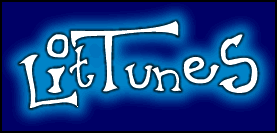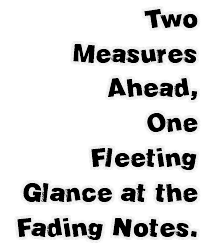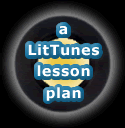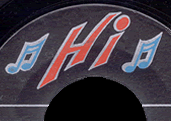|



A Time for Preview, Reflection
By Chris Goering
Fayetteville, Arkansas
February 27, 2013
I write today as we wrap up the first two months of 2013. The dawn of the twenty-teens still feels a little strange though, a little like a song played with an instrument slightly out of tune. Maybe each year feels that way. As 2013 progresses toward spring, there are newsy items all around me in terms of music and the teaching of English, so I thought it would be worthwhile to post a LitTunes preview and reflection.
LitTunes turned five-years-old in November, and the people at Google Analytics tell us that we are becoming an established open-access web for teachers. Over 80,000 people
 visited LitTunes in 2012, up considerably over prior years, and while things like numbers and statistics about usage are important to consider, the personal e-mails, phone conversations, relationships, and possibilities for the future give me the biggest charge. visited LitTunes in 2012, up considerably over prior years, and while things like numbers and statistics about usage are important to consider, the personal e-mails, phone conversations, relationships, and possibilities for the future give me the biggest charge.
Not surprisingly, the statistics tell us that LitTunes lesson plans are the most accessed part of our web and that we have visitors from all around the globe. Thanks, teachers, for making our free classroom resources a success.
I hope that you, dear readers, don’t find my telling you about past accomplishments and upcoming LitTunes-related events to be self-serving braggadocio. It’s just that I can’t contain my enthusiasm for the very special place we’ve created in service of literacy education.
For starters, I’ve been accepted to present twice at the International Reading Association in San Antonio. For one presentation, my collaborator is acclaimed author and award-winning teacher Alan Sitomer, who was featured in a 2009 LitTunes profile, Let’s Do the Hip-Hop. For the other, which is a longer symposium presentation, I’m part of a panel assembled by acclaimed author, scholar, and professor Lawrence Baines of the University of Oklahoma. In his role as editor, Dr. Baines published one of my very first attempts at scholarship way back in the day at secondaryenglish.com. Dr. Banes is involved in all sorts of good work, including the publication of several books, which are featured on his website.
Exploring the Possibilities
of Arts Integration Techniques
Alan and I are taking on the Common Core in our session. We will be demonstrating ways to build scaffolds from music and lyrics to argumentative and persuasive writing. We will discuss ways to apply close critical reading strategies to lyrics. We will also introduce a method for teaching writing through the integration of arts and lyrics. I demonstrated the method with some unsuspecting eighth-graders in Fayetteville this past fall, and the success of the demonstration was encouraging.
Arts integration techniques are the focus of my ongoing collaboration with Crystal Bridges Museum of American Art in Bentonville, Arkansas, the Walton Arts Center in my hometown, and a program at the University of Arkansas called ARTeacher Fellowship. It’s enriching, challenging work that inspires me to consider new ways to teach with music.
The session with Baines et al., will cover some familiar ground because I’ve been asked to share my observations about The Soundtrack of Your Life. Most of my career as a professional educator has been tracked alongside that idea and the writing assignments it has inspired. I first wrote about it for the National Writing Project as a teacher in 2004 under the title “Music and the Personal Narrative: The Dual Track to Meaningful Writing,” not suspecting the idea would gain so much staying power. I never tire of demonstrating or discussing Soundtrack with students or teachers, and someday I hope to publish a collection of student soundtracks from around the country.
Both sessions at the International Reading Association are on Sunday, April 21. If you’re going to San Antonio, please wear spurs on your boots, place some cactus flowers in your hair, and stop by the tent to say hello (or howdy). Rumor has it that LitTunes Intern Burgundy may make an appearance.
Finding Fogerty Leads to a Study
Of How to Teach the Vietnam War.
One other LitTunes-related artifact of the past year was a book chapter in Thomas Kitts’ Finding Fogerty: Interdisciplinary Readings of John Fogerty and Creedence Clearwater Revival. The effort was collaborative with LitTunes writer, teacher, and professor Will Sewell — great fun for the both of us. We gave a talk about our chapter at the National Council of Teachers of English convention in Las Vegas this past November, too. Our contribution to Finding Fogerty details multimodal ways of building background knowledge to help English teachers prepare lessons about the Vietnam War. Much to our chagrin, students today get the majority of their history about Vietnam from Forrest Gump and other distorted sources. Longtime readers of LitTunes may remember a 2009 conference update, the Right Notes, that featured Professor Kitts. The article landed us on the mailing list for his call for chapter proposals, a call I was happy to answer and share with Dr. Sewell.
The World Wide Web has been very kind and accepting of LitTunes, and I remain encouraged by all of the positive interactions with readers. In fact, I recently contacted some of those readers when assembling a one-day workshop on teaching English with music at a conference to be held later this year. While it might be taboo to discuss the proposal since it hasn’t been accepted, I’ll just say that if it does happen, I promise you’ll hear more about it.
While it is really nice to revisit so many of the positive elements of 2012 and 2013, I’d be remiss to not mention some of the setbacks as well. Conference proposals were turned down, article publications were sent back rejected, LitTunes essay and lesson plan ideas went unwritten, and opportunities were lost due to an overwhelming schedule.
Antidote, Sweet Balm
My ex-state motto, Ad Astra Per Aspra, declares, “To the stars through difficulty” — and I agree. There isn’t much good that’ll come from crying about things that didn’t happen, other than to turn the disappointment into resolve to avoid repeating mistakes. In times of doubt or discouragement, I find it's best, simply, to turn our full and sharpest focus on the students in our classes. While LitTunes is designed with an audience of teachers in mind, our little web is really about the students of those teachers, especially those students who may not feel connected to or challenged by their English class — ones like me, who always seemed to need a little shot in the arm from an antidote called music, a sweet balm sure to help us reach the goal, whatever it may be.

C a l l i n g A l l T e a c h e r s :
Let's hear from you!
Share you classroom experiences,
the joys and little daily triumphs of teaching,
the good ideas that come to you
as you creatively make your way
through another challenging school day.
LitTunes warmly accepts contributions
from our readers. Here's my address:
chris@littunes.com
LitTunes was launched in 2007.
We invite you to come back often.
You are warmly invited to participate, too.
Contact Chris Goering by E-mail at chris@littunes.com
LitTunes is a part of the CornDancer family of developmental websites.
CornDancer has participated in the World Wide Web since the summer of 2000.
Submissions are invited.
Contact webmaster at webmaster@littunes.com
|
|







 visited LitTunes in 2012, up considerably over prior years, and while things like numbers and statistics about usage are important to consider, the personal e-mails, phone conversations, relationships, and possibilities for the future give me the biggest charge.
visited LitTunes in 2012, up considerably over prior years, and while things like numbers and statistics about usage are important to consider, the personal e-mails, phone conversations, relationships, and possibilities for the future give me the biggest charge.
